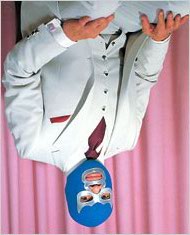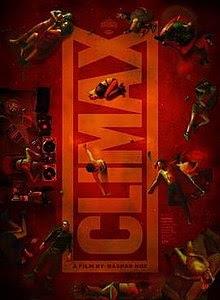2018 gangster movie
Rating: 6/20
Plot: Gotti rises to the head of a criminal operation and tries to be a good family man at the same time. Motherfuckers get in his way.
My friend Josh insisted that I watch
Gotti. I decided that a little Movies A-Go-Go action was the best move, but I didn't have much to say. Anyway, here are my unadulterated thoughts while watching Gotti, a movie about a guy who doesn't dance nearly enough to have John Travolta play him in a movie.
* * *
MoviePass Ventures. I’m sure this has something to do with their stock price dropping below a penny.
It’s the opening scene, and it’s clear that either John Travolta or John Gotti didn’t know what to do with his hands.
As this terrible rap song plays, it’s a good time to let you know that I don’t have any knowledge of John Gotti at all. I probably know less than the average person. This whole story will be a surprise for me.
“They took my tit, and they put it on my face.” That’s probably not far off from what happened to Travolta’s actual forehead.
The screenwriter loves the word “motherfuckers.”
As narrator, Gotti just asked me if I remembered a hit. Since it’s literally the only thing that’s happened in the movie so far, it’s kind of tough not to remember it.
I also remember how he leaned awkwardly in order to watch a boxing match on the television at the bar.
Was that the theme from Shaft playing during that shower scene?
“What’s that movie you like so much? About spaghetti or meatballs or something?” What the hell is he talking about?
From IMDb: "Pitbull was so impressed with the similarities between a photograph of John Travolta as John Gotti and the real Gotti that he asked if he could be involved with the score for the whole film."
From Shane: "Pitbull is apparently mentally challenged."
John Travolta shouldn’t be allowed to play a guy who watches football games like a normal human being.
My favorite move this thing’s making is having a character introduced through the dialogue (“That’s Sammy Bull”) and then immediately putting words on the screen so that we can also read who they are.
When I think of gangster movie music, I think of Blondie.
Travolta can do whatever he wants to his career, but did he really have to drag his wife into this mess?
Sprinkler establishing shot.
I probably shouldn’t have laughed when the kid on the scooter got hit by a car. I just couldn’t help myself.
This soundtrack is a mess. All over the place.
I’m not great at making inferences, but I can tell by the way that Travolta is digging deep and biting his fist that the kid died.
It’s unclear how a person driving 12 miles per hour can hit a kid and kill him. Kid must have had a weak skull or something.
Kelly Preston’s acting is about as bad as her husband’s.
Wait, the dead kid didn’t have a hair on his prick? That definitely does make this whole thing even sadder. Why, God? Why!?
Who’s that guy sitting in your chair, Gotti? Well, it appears to be Santa Claus. Seems like you should have recognized him.
Why does this clearly adult Christmas party have a Santa Claus anyway?
It might be because I’ve lost interest or it might be the jumpy storytelling, but I have to admit I don’t have a firm handle on what’s going on in this movie.
Travolta’s hands are out of control in this movie. They’re trying to win an Academy Award all by themselves.
I just paused this to get some tea, and I’m just over 48 minutes into this. It feels like I’ve been watching this for hours!
I have a lot of vodka in me right now and might not be entirely lucid. I decided to drink a little and read a book on the porch instead of getting tea. Consider that a warning, friends!
Sparks Steak House, located at 42nd and 3rd. The street sign visual helped me understand what those numbers looked like.
It’s especially sadistic to not even let a man eat his steak before you shoot him.
You know how I mentioned earlier that I didn’t know anything about John Gotti going into this? I’m an hour into the movie and still don’t know anything about him other than his love of the word “motherfucker.”
Watching this, you get the feeling that Travolta thought he’d get some award buzz solely because of his pursed lips.
And there’s the “Walk Like an Egyptian” snippet that everybody probably expected to hear.
Every time Travolta starts narrating, I think, “Oh, yeah. This movie has a narrator.”
This movie is twice as bad as it could have been just because of the soundtrack. I think I might be hearing Duran Duran now?
Gotti, now as dead as Travolta’s career.
This “House of the Rising Sun” doesn’t really fit either. Who the hell put this soundtrack together?
This seems very sympathetic to Gotti’s family, doesn’t it? It’s almost a love letter to the legacy of John Gotti. At the very least, it’s painting him as this anti-hero, but I’m not sure it’s working.
“Listen to me, and listen good. You’re never gonna see a guy like me again if you live to be 5,000.” Oh, geez. What a brilliant coda.
This is the
Battlefield Earth of gangster flicks. That isn’t a compliment.





















